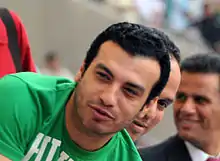Ehab Tawfik
Ehab Tawfik (Arabic: إيهاب توفيق (Born January 7, 1966) is an Egyptian singer.[1]
Ehab Tawfik إيهاب أحمد توفيق محمد مصطفي | |
|---|---|
 | |
| Background information | |
| Birth name | Ehab Ahmed Tawfiq Mohamed Mostafa |
| Born | 7 January 1966 |
| Origin | Cairo, Egypt |
| Genres | Arabic |
| Occupation(s) | Composer, singer |
| Years active | 1989–present |
| Labels | Sonar, Pigeon Records, High Quality, Rotana, Alam El Phan, Delika, Ehab Tawfik Productions |
Biography
Tawfiq learned how to play the lute as a child, and his love for music started when he was nine years old. His first single, "Dany", was released in 1989. His first album Ekminny was released in 1990. In 1995, he received his master's degree for his thesis, The Egyptian Song in the Second Half of the Twentieth Century.
Ehab worked toward his Doctorate in Music and Arabic Singing, completed in April 2002. The doctorate was titled The Methods of Performing Arabic Singing in Egypt During the Second Half of the Last Century. He is one of the top singers in the Arab world and is especially revered in his hometown.
His greatest exposure as an artist came on 26 February 2001, when he performed for 50,000 people at a benefit concert to raise funds for Iraqis who were maimed during the Gulf War in Baghdad. Ehab signed with record label Alam El Phan in 2007. He has two children, Ahmed and Mahmoud, with his wife Nada.
In 2007, Ehab Tawfik received critical acclaim for his song (Arabic: إلا رسول الله, lit. 'Except the Prophet of Allah'). The song was released in response to the Danish cartoons that negatively depicted the prophet. His song Taala Nesameh featured in the Egyptian film Kashf Hesab (2007), starring Nour and Khaled Abol Naga. He was featured on Danish band Outlandish's track "Keep the Record on Play".
Personal life
Tawfik married Nada Rizk after the age of 40, with whom he has a twin boys, Ahmad and Mahmoud in 2008, and a girl, Jude in 2014.[2]
His father, Ahmad, died from a blaze in his villa in Nasr City in January 2020, six years after his wife passed away.[3]
Hits
His hit songs include "Habibi" ("My Darling"), "Sahrany" ("She Enchanted Me"), "Tetraga Feya" ("Begging Me"), "Hobbak Aliminni" ("Your Love Taught Me"), and Allah Alek Ya Seede have all been popular in Arabic speaking countries.
| Year | Title | English Artist credit |
|---|---|---|
| 1990 | Ekminny | Ehab Tawfik |
| 1991 | Marasil | Ehab Tawfik |
| 1993 | Rasamtek | Ehab Tawfik |
| 1994 | Hataddi | Ehab Tawfik |
| 1995 | Ada El Lail | Ehab Tawfik |
| 1996 | El Donia | Ehab Tawfik |
| 1997 | Yaashak Amar | Ehab Tawfik |
| 1999 | Sahrany | Ehab Tawfik |
| 2000 | Habib el Alb | Ehab Tawfik |
| 2002 | Homma Kelmetain | Ehab Tawfik |
| 2003 | Leeh El Khesam | Ehab Tawfik |
| 2004 | Esmak Eih | Ehab Tawfik |
| 2005 | Hobek Alemni | Ehab Tawfik |
| 2007 | Ahla Menhom | Ehab Tawfik |
| 2008 | Ella Rassoul Allah | Ehab Toufik |
| 2009 | Lezem Tesmaa | Ehab Tawfik |
| 2010 | Ahla Samrah | Ehab Tawfik |
| 2011 | Arehina Ya Belal | Ehab Tawfik |
| 2016 | Kol Youm Yehlaw | Ehab Tawfik |
References
- Harris, Craig. "Ehab Tawfiq". AllMusic. Retrieved 18 August 2011.
- "إيهاب توفيق.. لم يتزوج إلا بعد الأربعين بسبب عقدة.. شاهد". kollelngoom.com (in Arabic). 1 April 2016.
- ""الصور الأولى" من جنازة والد إيهاب توفيق". kollelngoom.com (in Arabic). 9 January 2020.